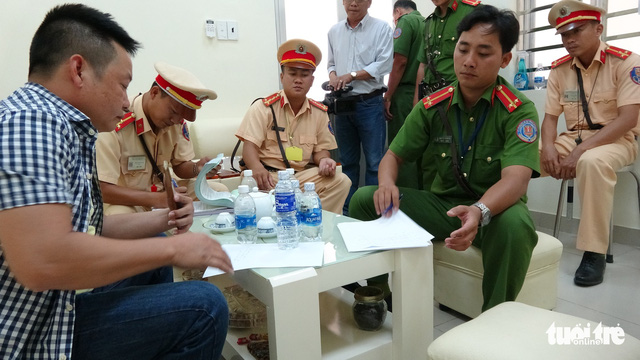Drivers in Vietnam might have been stripped off an effective way of staging peaceful protests at tollgates across the country as a new anti-protest measure, which took effect in January, has found its first victim.
Nguyen Minh Hung, 38, became the first driver to be slapped with an administrative fine for causing congestion at a toll station in southern Vietnam’s Can Tho City on Friday.
The tollgate, which charges drivers for using the National Highway 91 through Can Tho, has been criticized for its location, which forces even those who only drive on a few hundred meters of the road to pay the full toll.
After arriving at the toll station at around 2:00 pm on Friday, Hung demanded that he be charged for only the 100-meter distance he would drive on the National Highway 91 before turning on another road.
His demand not met, Hung refused to neither pay the toll nor move his vehicle out of the tollgate as a sign of protest, which lasted nearly an hour.
The driver was later handed an undisclosed administrative fine by the traffic police of Can Tho’s Thot Not District for violating a ban on parking vehicles at toll stations for more than five minutes.
The regulation, rolled out nationwide in January, has been seen as a counter-measure to constant drivers’ protest at controversial tollgates across Vietnam.
 |
| A driver passes the Cai Lay toll booth in Tien Giang, southern Vietnam, on December 1, 2017. Photo: Tuoi Tre |
The protests, ignited by outcries last August at the Cai Lay tollgate in southern Vietnam’s Tien Giang Province, condemn similar build-operate-transfer (BOT) traffic projects which are located so that drivers are forced to pay fees for roads they don’t use.
Starting from Cai Lay, the wave of drivers’ opposition has spread to a number of other tollgates in the Mekong Delta region, prompting the Directory of Vietnam Roads to issue a ban on drivers stopping for more than five minutes at toll stations, effective from January 25.
Violating drivers are to face administrative fines as decided by local transport departments, it said in the statement announcing the new regulation.
Like us on Facebook or follow us on Twitter to get the latest news about Vietnam!






















































